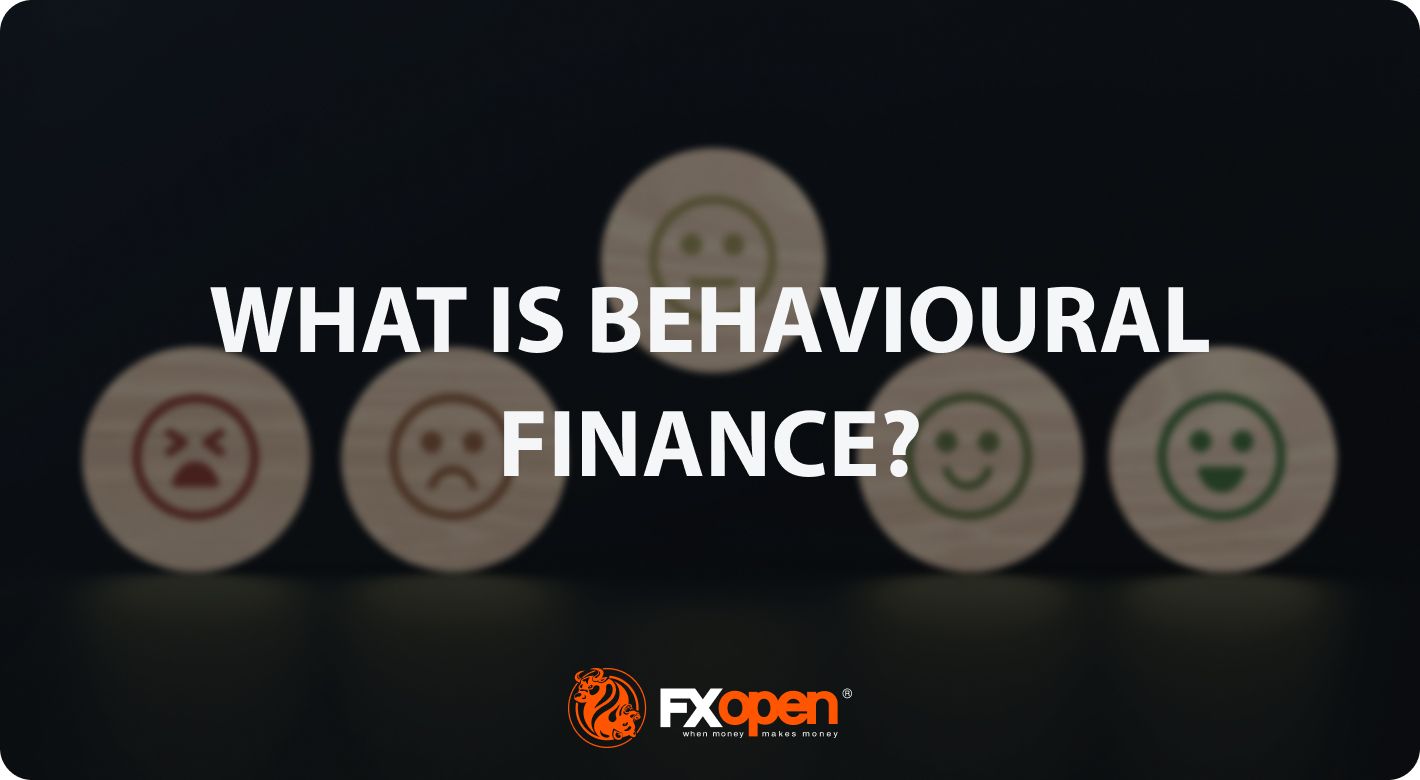FXOpen

Behavioural finance is a field that combines the principles of psychology and economics to understand how human behaviour affects financial decisions and markets. It recognises that people are not always rational, and their emotions, biases, and cognitive errors can influence their financial choices.
Behavioural finance is a growing field of study that continues to gain recognition and influence in the sector. Researchers study how people process information, how they form expectations, and how they react to market events. In this FXOpen article, we will consider the cornerstones of behavioural finance theory.
Behavioural Finance Definition
Let’s start with the behavioural finance theory. Behavioural finance is the study of how psychological factors, such as emotions and biases, impact financial decision-making and market outcomes. It seeks to explain why people often deviate from rationality when making financial decisions and how these deviations lead to market fluctuations.
The emergence of behavioural finance can be traced back to the groundbreaking work of Daniel Kahneman and Amos Tversky in the 1970s. Today, big-name universities around the world continue to study the impact of different factors on decision-making in business, investing, and personal finance.
Understanding Economic Behaviour and Psychology
Behavioural finance recognises that economic behaviour is determined by more than rationality and self-interest. The study takes into account the following psychological factors:
- Emotional influence. Emotions like fear, greed, and overconfidence lead a person to make irrational choices, e.g. adding funds to a losing trade or changing take-profit targets to cover more gains.
- Behavioural financial biases. Many biases influence decision-making, for example, confirmation bias (favouring information that confirms pre-existing beliefs) and accessibility bias (overestimating the importance of readily available information).
- Cognitive errors. People are prone to cognitive errors, such as overestimating their abilities or relying on heuristics (mental shortcuts) instead of careful analysis.
What Is Economic and Financial Heuristics?
Heuristics is the process by which people use mental shortcuts and simple strategies to quickly form judgements and make decisions. In the context of behavioural finance, economic and financial heuristics refer to cognitive shortcuts that simplify financial decision-making. The most common of them include:
Representativeness heuristic: judgments are based on similarity to a prototype or stereotype. For example, an investor may assume that a company with a well-known brand is a safer investment, even if there is no objective evidence to support this belief.
Availability heuristic: judgments rely on the ease with which relevant examples or information come to mind. For example, an investor may invest in a particular industry if they recently read positive news about it, even if the overall market conditions are unfavourable.
Anchoring heuristic: this involves individuals forming estimates by commencing from an initial value, often referred to as an "anchor." For example, an investor may anchor their price estimate for a stock based on its current market price, even if the fundamental factors suggest a different valuation.
If you are interested in the topic of trading psychology and want to learn more, explore our blog. We’ve posted several related articles you may like. We are happy to provide our clients with valuable insights that could help them gain new skills and knowledge.
Behavioural Finance Biases
As we mentioned, behavioural finance recognises that investors can be irrational and that their decisions can be influenced by biases. Here are some of the potential biases:
Self-attribution bias — traders attribute positive investment results to their own skills and blame negative results on external factors or bad luck.
Confirmation bias — people pay close attention to information that supports a financial or investment belief and disregard whatever contradicts it.
Framing bias — an investor reacts to a certain financial opportunity based on how it is presented. The way information is framed influences their choices.
Loss aversion — the fear of losing money may become a more powerful inhibitor for an investor; if it is, they won’t take risks and may miss out on potential profits.
Cognitive Errors
Apart from behavioural biases in finance, there are inefficient decisions that could be partially the result of cognitive errors. Cognitive distortions are rigid errors in thinking that grossly misinterpret events in harmful or negative ways. These patterns are full of assumptions and incorrect logic, while real-world evidence does not back them up. The most common errors include:
- Filtering
- Polarisation
- Overgeneralisation
- Discounting the positive
- Hasty conclusions
- Catastrophising
Everyone falls into cognitive distortions from time to time, but if you engage too frequently in negative thoughts, your mental health can take a hit.
Emotional Reasoning
Emotional reasoning refers to a cognitive mechanism through which a person arrives at the belief that their emotional reaction validates the truth of a statement or situation, even in the presence of contradictory evidence. Fear and greed are strong emotions that often drive people to make blind decisions. Fear can lead to panic selling during market downturns, while greed can lead to excessive risk-taking and speculative behaviour.
How Does Investor Behaviour Differ?
The frequent prejudices seen in investor behaviour are:
- Herding — when investors follow the crowd and base their actions on what others do (buy, hold, or sell).
- Overconfidence — when investors overestimate their abilities and believe they can consistently outperform the market.
How Does Trader Behaviour Differ?
Traders may be influenced by the following:
- Momentum trading — when they follow trends and buy or sell based on recent price movements rather than fundamental analysis.
- Overtrading — when traders engage in excessive buying and selling, driven by emotions like fear or greed.
- Confirmation bias — when traders overvalue their pre-existing beliefs and ignore contradictory evidence.
Market Psychology
Market psychology is based on the emotional factors that influence the decisions of participants in financial markets. People's behaviour is often driven by their perceptions, beliefs, and expectations about the market and the economy. They are influenced by news events, economic data, and geopolitical developments. Let’s consider three common examples of market inefficiencies explained by psychology:
- Market bubbles, when asset prices become detached from their underlying fundamentals, can be driven by herd behaviour and excessive optimism.
- Market crashes, when assets lose value for no particular reason, can be triggered by panic selling and fear.
- Market anomalies, such as the value premium or the momentum effect, suggest that investors deviate from rationality and create opportunities for profit. These anomalies cannot be explained by traditional studies but can be justified by behavioural finance theories.
Final Thoughts
In recent years, this field has gained momentum; for example, scientists exploring the impact of the COVID-19 pandemic and the development of online services that influence consumer preferences. As this field evolves, it’s likely to have a significant impact on the way we think about investing and managing risk.
Technical analysis indicators may help traders overcome behavioural finance bias and base their decisions on price data and effective indicators and patterns that have been used by traders for years. To try them, you can use the FXOpen TickTrader platform. If you are ready to start trading, you can open an FXOpen account.
This article represents the opinion of the Companies operating under the FXOpen brand only. It is not to be construed as an offer, solicitation, or recommendation with respect to products and services provided by the Companies operating under the FXOpen brand, nor is it to be considered financial advice.
Stay ahead of the market!
Subscribe now to our mailing list and receive the latest market news and insights delivered directly to your inbox.








